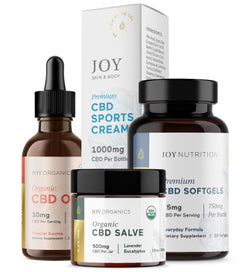
At first glance, it may seem that CBD and hemp oil are the same thing—after all, they both come from cannabis plants. However, despite their shared origin, these oils are completely different and offer unique benefits to the human body. While they may look similar, they are extracted from different parts of the plant and have varying levels of cannabinoids and other compounds. So, CBD versus hemp oil—not sure which one is right for you? Let’s discuss the differences between CBD and hemp oil, and how they can be used to support a healthy lifestyle.
An Intro to Cannabis
Cannabis is a complex plant that produces a wide variety of compounds, including fats, terpenes, and cannabinoids. Each of these compounds plays an important role in the unique effects that cannabis, and its various products, have on the body.
Cannabinoids are perhaps the most well-known of these compounds, including THC and CBD, among others. These cannabinoids interact with the body's endocannabinoid system, which influences many physiological functions such as mood, appetite, and sensation.
In addition to cannabinoids, cannabis also produces a range of terpenes, which are aromatic chemicals that have their own potential health benefits. When terpenes are in the presence of cannabinoids, all of these compounds work in synergy to enhance each molecule’s overall effect.
Lastly, parts of the cannabis plant produce many fatty acids, including omega-3s and omega-6s, which are essential for maintaining optimal health.
The specific composition of these compounds varies depending on the strain of cannabis and how it is grown and processed. This variability allows for a wide range of products that can be tailored to meet the needs of different individuals. For example, strains with high levels of THC could provide intense euphoria. Meanwhile, strains with low levels could be beneficial for supporting restful sleep.
What Is Hemp Oil?
Hemp oil, also known as hemp seed oil, is a type of oil that is extracted from the seeds of the industrial hemp plant. Unlike CBD oil—which is extracted from the flowers and leaves of the hemp plant—hemp oil contains no cannabinoids and is instead rich in essential fatty acids, vitamins, and minerals.
To extract hemp oil, the seeds are first cleaned and dried and then mechanically pressed for extraction. This results in an unrefined oil that retains its natural nutritional content. The oil can then be further refined to remove any impurities and improve its taste and texture.
Hemp oil has a wide range of uses, both in the kitchen and in personal care products. In the kitchen, it can be used as a cooking oil or salad dressing and can even be added to smoothies and other recipes. It has a nutty flavor and is rich in omega-3 and omega-6 fatty acids, making it a healthy addition to any diet.
In personal care products, hemp oil is often used as a moisturizer due to its high concentration of fatty acids and ability to penetrate the skin. It can also be used as a hair conditioner or scalp treatment, as it helps to nourish and strengthen hair follicles.
Some potential benefits of using hemp oil include supporting a healthy immune system and heart health. Its high fat content also makes hemp oil excellent for anyone’s skin and hair routine
To use hemp oil, it can be consumed orally or applied topically to the skin or hair. When using it in the kitchen, it is important to keep in mind that it has a low smoke point, so it should not be used for high-heat cooking. Overall, hemp oil is a versatile and nutrient-dense oil that can be a valuable addition to any wellness routine.
What Is CBD Oil?
CBD oil is a type of oil that is extracted from the flowers and leaves of the hemp plant. It contains a high concentration of cannabidiol (CBD), one of the many cannabinoids found in cannabis plants. Unlike THC, another well-known cannabinoid, CBD does not produce intoxicating effects.
To extract CBD oil, hemp plants are first harvested and dried, and then the flowers and leaves are separated from the rest of the plant material. The CBD is then extracted using a variety of methods, including CO2 extraction, ethanol extraction, or oil infusion. This results in a concentrated oil that can be used for a variety of purposes.
CBD oil has a wide range of potential uses, including supporting mood, promoting comfortable joints and muscles, and helping with relaxation. It’s often consumed in the form of tinctures, capsules, or gummies or used topically in the form of creams or balms.
CBD Compared to Hemp Oil Chart
|
Hemp Oil |
CBD Oil |
|
|
Source |
Extracted from hemp seeds |
Extracted from hemp flowers and leaves |
|
Cannabinoids |
Contains no cannabinoids |
Contains high levels of CBD, other potential cannabinoids (depending on plant) |
|
THC Content |
No THC |
< 0.3% THC (Farm Bill compliant) |
|
Extraction Method |
Mechanical pressing and refining |
CO2 extraction, ethanol extraction, or oil infusion |
|
Uses |
Nutritional supplement, personal care products |
Health purposes, post-workout recovery, stress, sleep |
|
Benefits |
Rich in essential fatty acids, vitamins, and minerals |
Promoting a balanced inflammatory response, promoting calm, overall wellness. |
|
Side Effects |
Generally considered safe |
Possible side effects include dry mouth, nausea, and dizziness |
|
Legal Status |
Legal in most countries |
Legal in some countries (check local regulations) |
When to Use CBD Versus Hemp Oil
When it comes to deciding whether to use CBD or hemp oil, it largely depends on your individual needs and preferences. While both oils are derived from the hemp plant, they have different chemical compositions and effects on the body.
CBD oil is often used for overall mind and body wellness benefits. Some people use CBD oil to support their mood and sleep, while others find it useful for sore muscles after working out or stiff joints in the morning.
Hemp oil, on the other hand, is often used as a dietary supplement due to its rich nutritional content. If you are looking to support your overall health and well-being, hemp oil may be a good choice for you. It is a good source of essential fatty acids, vitamins, and minerals and can be easily incorporated into your diet. Hemp oil is also a popular choice for use in personal care products due to its moisturizing properties.
Ultimately, the decision to use CBD or hemp oil comes down to your individual needs and goals. It is important to consult with a healthcare professional before incorporating any new supplements or products into your wellness routine, especially if you have underlying health conditions or are taking any medications. With the right information and guidance, you can make an informed decision about which oil is right for you.
Can You Use CBD and Hemp Oil Together?
Combining CBD oil and hemp seed oil can offer a number of potential benefits, even though they have their differences, as the two oils have complementary properties that can work together to support overall health and well-being. Here are some ways that combining CBD oil and hemp seed oil can complement one another:
Better Absorption
CBD oil can be difficult for the body to absorb on its own. However, when combined with hemp seed oil—which is highly bioavailable and easily absorbed by the body—it can enhance the absorption of CBD and potentially improve its effectiveness.
Skin Health
Both CBD oil and hemp seed oil have moisturizing and nourishing properties that can benefit the skin. When used together in a topical product, such as a cream or salve, they can help to soothe dry skin and promote overall skin health.
Balanced Omega Fatty Acids
Hemp seed oil is rich in omega-3 and omega-6 fatty acids, which are essential for maintaining optimal health. Many CBD oils are concentrates that are mixed with carrier oils rich in healthy fats, such as MCT or extra virgin olive oil.
When combined with CBD oil, which can also contain omega-3 and omega-6 fatty acids, the result is a product that offers a balanced ratio of these essential fatty acids.
Overall, combining CBD oil and hemp seed oil can produce a product that offers a range of potential benefits for overall health and wellness, especially when used in moderation and under the guidance of a healthcare professional.
Hemp Versus CBD: What’s the Deal?
Both CBD oil and hemp seed oil have their unique properties and potential benefits. Hemp seed oil is rich in essential fatty acids, vitamins, and minerals and can be used as a dietary supplement or in personal care products. On the other hand, CBD oil is often used for wellness purposes such as supporting mood, sleep, and physical and mental health.
While the two oils are often used together, it's important to note that they are not interchangeable and have different properties and uses. However, they could be complementary to one another. So, explore these cannabis products to find the right product, or combination of products, for you.
Hannah Smith is Joy Organics Director of Communications. She is driven by her passion for providing clear and accessible wellness and CBD education. In 2015, she received her BA in Media, Culture and the Arts from The King’s College in New York City and before Joy Organics, worked as writer and photographer in the Middle East and North Africa. Her work has been featured on Forbes, Vice, Vox, Denver Post, and the Coloradoan.








